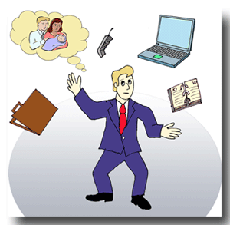 mTimeCard
mTimeCard
 mTimeCard
mTimeCard

Okay, we said a lot about managing employee time and attendance. Tracking employee hours, plan shifts in advance, provide incentives and try to increase their productivity. But what about your own productivity and time management?
The article will now explore four easy ways to improve your personal time and effectiveness.
1. Set Clear Deadlines for Your Tasks
While it may seem a good idea not to set due dates for all of your tasks, there is a high risk of putting some work off right away, then put it off some more….and then you may never finish it.
Certainly, a deadline doesn’t guarantee you will finish a project or task on time, but at least it gives you a sense of organization and something to shoot for.
Another great idea is to set milestones for yourself, representing a certain level of the task which should be completed for a given amount of time.
In the best scenario, you can combine deadlines and milestones and assign both to everything, even subtasks and minor items, so you won’t dawdle.
2. Refuse to multitask
If you do not set clear boundaries between tasks, they will inevitably interfere with each other. Focusing on a single or just a few tasks will help you to be more concentrated and significantly more effective than trying to work on all projects simultaneously. In other words – less volume, more time. The trick here is to pick no more than 3 major tasks a day and relentlessly pursue those. This will not only increase you productivity, but at the end of the day it will also give you a feeling that you have completed something really significant, rather than “a few parts” from here and there.
3. Kill notifications
Modern technology has become so advanced that it chases all the time and exploits our urgency addiction: our email, Facebook, Twitter and Quora and many more are constantly distracting ourselves and taking our minds away from the important tasks. Fortunately, this can be easily fixed: turn off all notifications and concentrate fully on your current agenda. You can always check your email and social accounts when you have more time to be distracted-for examole, during the lunch break or at the end of the working day when you have completed your most important tasks for the day.
4. Learn how to ignore
Yes, it may be rude and unprofessional, but sometimes is also utterly necessary. There are probably people you just won’t find the time to reply to. There are questions and requests you can allow yourself to forget. You can be slow to do things like tidy up, pay bills, do the shopping or open your mail. And still, the world fall apart. There is nothing wrong to ignore certain aspects of your everyday tasks. Again, the payoff is you get done what really matters.
Source: Forbes